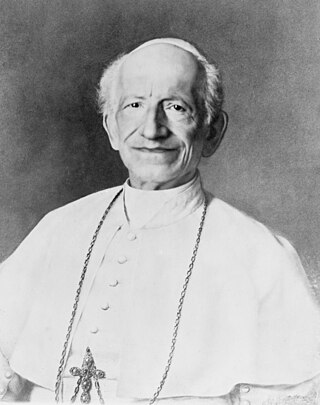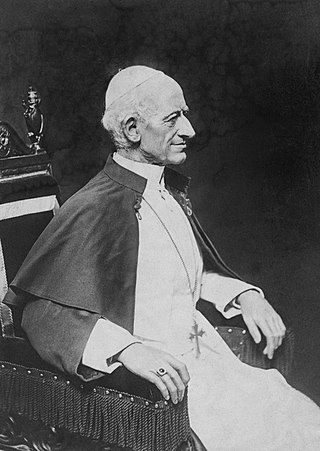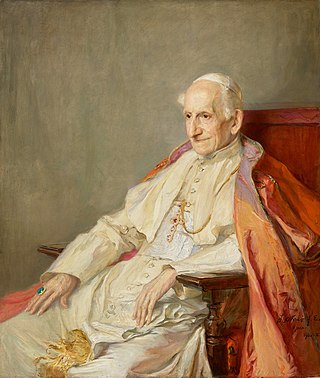Encyclical of Pope Leo XIII | |
|---|---|
| Signature date | 8 February 1884 |
Nobilissima Gallorum gens ("The Most Noble French Nation") is an encyclical published by Pope Leo XIII on 8 February 1884. In this encyclical, the pope explicitly sought "to defend the Catholic interests of France."
Leo XIII addressed French Catholics during the particular context of the conflict between the nascent French Third Republic and the Church in France, which opposed the anti-clerical legislation of the regime.
He first retraces the history of the Church of France, "which had the honor of being called the Eldest Daughter of the Church," evoking the Gesta Dei per Francos and the Crusades. He then reminded French Catholics of their duties:
The pope denounced a philosophy "that seeks to eradicate the foundations of Christian truth," a justice detached from divine principles, and the "errors that inevitably bring about the ruin of the State." He argued that the teachings of the Catholic Church were, in contrast, "very effective in maintaining order and ensuring the salvation of the Republic."
As an example, he pointed to the education of youth, which he argued should not be instructed in neutrality regarding their duties toward God, as this "directly opens the way to atheism." He called on fathers to assume their responsibilities. Above all, he emphasized "the reciprocity of the rights and duties of political authority and the 'religious power.'" He acknowledged the existence of two powers, both subject to the natural law and eternal law.
Leo XIII did not desire discord in a country that had experienced much ruin and proposed the collaboration of the Church for the good of the nation, provided that the Republic recognized Catholics' rights to live under a legislative and political framework aligned with natural principles and ensured the Church's freedom to teach divine principles. However, the pope noted "with concern, measures" emerging in France that were detrimental to the Church and "provoking hatred and slander against her."
He specifically mentioned the law dissolving religious congregations and the protest letter he sent to the president of the Republic in June 1883 (Jules Grévy).
Finally, he exhorted bishops and clergy to defend the Church's freedom and called on the laity to work for unity, contribute to the common good, and support initiatives of social solidarity.
This encyclical was interpreted as a preliminary move towards reconciling Catholics with the French Third Republic, a theme Leo XIII would later expand upon in his 1892 encyclical Au milieu des sollicitudes , which led to the ralliement of Catholics concerned with the social doctrine of the Church and a minority faction of liberal bishops seeking social appeasement.
However, this maneuver was rejected by the Third Republic, which continued its struggle against religious congregations and pursued a policy of secularization, culminating in the confiscation of congregations' assets, their expulsion, and the nationalization of Church property during the separation of Church and State in 1905.
These conflicts subsided out of necessity on both sides during the war of 1914–1918.
Dignitatis humanae is the Second Vatican Council's Declaration on Religious Freedom. In the context of the council's stated intention "to develop the doctrine of recent popes on the inviolable rights of the human person and the constitutional order of society", Dignitatis humanae spells out the church's support for the protection of religious liberty. It set the ground rules by which the church would relate to secular states.

Pope Leo XIII was head of the Catholic Church from 20 February 1878 until his death in July 1903. Living until the age of 93, he was the oldest pope whose age can be validated, and had the fourth-longest reign of any pope, behind those of Peter the Apostle, Pius IX and John Paul II.
Quanta cura was a papal encyclical issued by Pope Pius IX on 8 December 1864. In it, he decried what he considered significant errors afflicting the modern age. These he listed in an attachment called the Syllabus of Errors, which condemned secularism and religious indifferentism.
The relations between the Catholic Church and the state have been constantly evolving with various forms of government, some of them controversial in retrospect. In its history, the Church has had to deal with various concepts and systems of governance, from the Roman Empire to the medieval divine right of kings, from nineteenth- and twentieth-century concepts of democracy and pluralism to the appearance of left-wing and right-wing dictatorial regimes. The Second Vatican Council's decree Dignitatis humanae stated that religious freedom is a civil right that should be recognized in constitutional law.

Rerum novarum, or Rights and Duties of Capital and Labor, is an encyclical issued by Pope Leo XIII on 15 May 1891. It is an open letter, passed to all Catholic patriarchs, primates, archbishops and bishops, that addressed the condition of the working classes.
Modernism in the Catholic Church describes attempts to reconcile Catholicism with modern culture, specifically an understanding of the Bible and Sacred Tradition in light of the historical-critical method and new philosophical and political developments of the late 19th and early 20th centuries.
Quadragesimo anno is an encyclical issued by Pope Pius XI on 15 May 1931, 40 years after Leo XIII's encyclical Rerum novarum, further developing Catholic social teaching. Unlike Leo XIII, who addressed the condition of workers, Pius XI discusses the ethical implications of the social and economic order. He describes the major dangers for human freedom and dignity arising from unrestrained capitalism, from socialism, and from communism as practised in Russia. He also calls for the reconstruction of the social order based on the principles of solidarity and subsidiarity.
Americanism was, in the years around 1900, a political and religious outlook attributed to some American Catholics and denounced as heresy by the Holy See.
Catholic social teaching (CST) is an area of Catholic doctrine which is concerned with human dignity and the common good in society. It addresses oppression, the role of the state, subsidiarity, social organization, social justice, and wealth distribution. CST's foundations are considered to have been laid by Pope Leo XIII's 1891 encyclical, Rerum novarum, which advocated distributism. Its roots can be traced to Catholic theologians such as Thomas Aquinas and Augustine of Hippo. CST is also derived from the Bible and cultures of the ancient Near East.

Providentissimus Deus, "On the Study of Holy Scripture", was an encyclical letter issued by Pope Leo XIII on 18 November 1893. In it, he reviewed the history of Bible study from the time of the Church Fathers to the present, spoke against the errors of the Rationalists and "higher critics", and outlined principles of scripture study and guidelines for how scripture was to be taught in seminaries. He also addressed the issues of apparent contradictions between the Bible and physical science, or between one part of scripture and another, and how such apparent contradictions can be resolved.

Humanum genus is a papal encyclical promulgated on 20 April 1884 by Pope Leo XIII.
Pacem in terris is a papal encyclical issued by Pope John XXIII on 11 April 1963, on the rights and obligations of people and their states, as well as proper interstate relations. It emphasizes human dignity and human equality in endorsing women's rights, nuclear nonproliferation and the United Nations.
Centesimus annus is an encyclical which was written by Pope John Paul II in 1991 on the hundredth anniversary of Rerum novarum, an encyclical issued by Pope Leo XIII in 1891. It is part of a larger body of writings, known as Catholic social teaching, which trace their origin to Rerum novarum and aim to relate the teachings of Jesus to the industrial age.

Immortale Dei written in 1885 is one of five encyclicals of Pope Leo XIII on Church-State relations.

The Mariology of the popes is the theological study of the influence that the popes have had on the development, formulation and transformation of the Roman Catholic Church's doctrines and devotions relating to the Blessed Virgin Mary.

Mary of the Divine Heart, born Maria Droste zu Vischering, was a German noblewoman and religious sister of the Catholic Congregation of Our Lady of Charity of the Good Shepherd. She is best known for having influenced Pope Leo XIII to consecrate the world to the Sacred Heart of Jesus. Pope Leo XIII called the solemn consecration "the greatest act of my pontificate".

Formal diplomatic relations between the Holy See and the current Federal Republic of Germany date to the 1951 and the end of the Allied occupation. Historically the Vatican has carried out foreign relations through nuncios, beginning with the Apostolic Nuncio to Cologne and the Apostolic Nuncio to Austria. Following the dissolution of the Holy Roman Empire and the Congress of Vienna, an Apostolic Nuncio to Bavaria replaced that of Cologne and that mission remained in Munich through several governments. From 1920 the Bavarian mission existed alongside the Apostolic Nuncio to Germany in Berlin, with which it was merged in 1934.
Subsidiarity is an organizing principle that matters ought to be handled by the smallest, lowest or least centralized competent authority. Political decisions should be taken at a local level if possible, rather than by a central authority. The Oxford English Dictionary defines subsidiarity as the idea that a central authority should have a subsidiary function, performing only those tasks which cannot be performed effectively at a more immediate or local level.

The theology of Pope Leo XIII was influenced by the ecclesial teachings of the First Vatican Council (1869-1870), which had ended only eight years before his election in 1878. Leo issued some 46 apostolic letters and encyclicals dealing with central issues in the areas of marriage and family and state and society.

The history of secularism in France is the birth and development of this principle up to the present day.